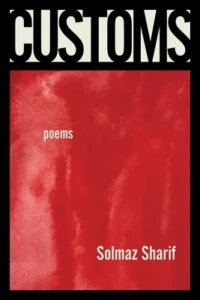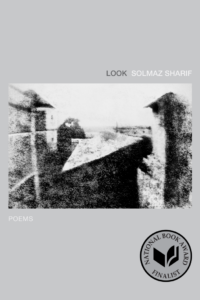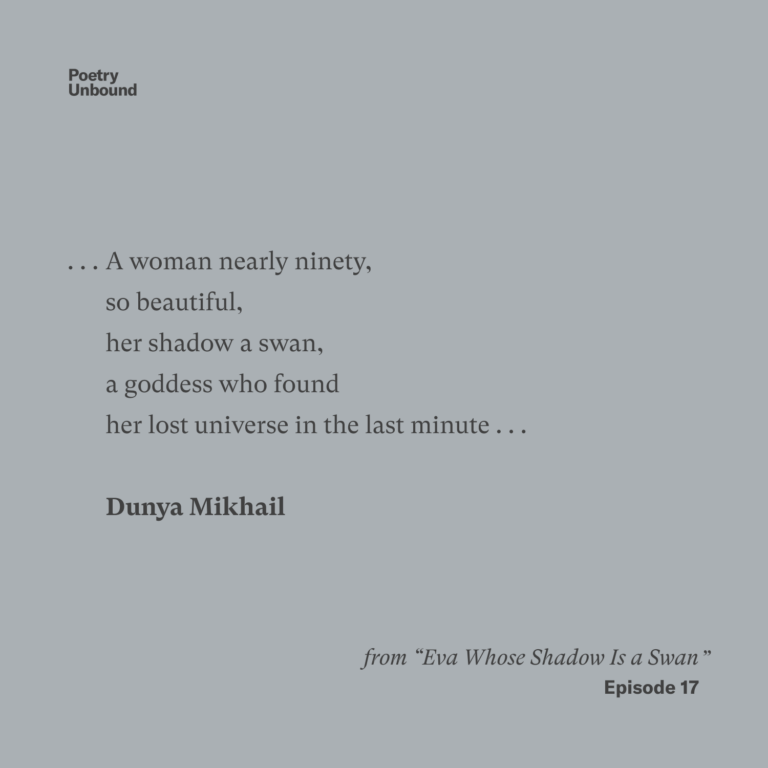Solmaz Sharif
Self-Care
Who decides what’s self-care and what isn’t? Who benefits? Who pays? Upon whom does the burden of self-care rest? Solmaz Sharif excavates.
We’re pleased to offer Solmaz Sharif’s poem, and invite you to connect with Poetry Unbound throughout this season.
Pre-order the forthcoming book Poetry Unbound: 50 Poems to Open Your World and join us in our new conversational space on Substack.
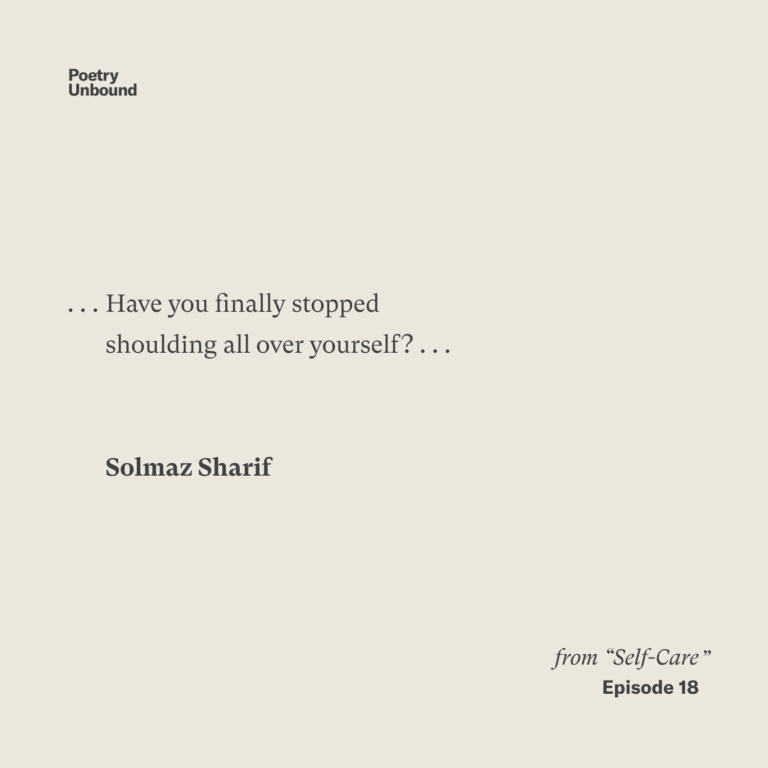
Guest
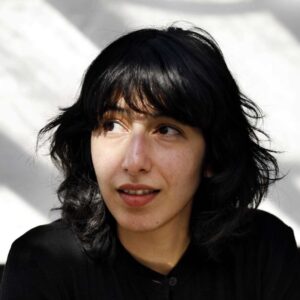
Solmaz Sharif is the author of Customs (Graywolf Press 2022) and Look (Graywolf Press 2016), and was a finalist for the National Book Award. She holds degrees from UC Berkeley, where she studied and taught with June Jordan’s Poetry for the People, and New York University. Her work has appeared in Harper’s, The Paris Review, Poetry, The Kenyon Review, the New York Times, and others. She is currently an Assistant Professor in Creative Writing at Arizona State University where she is inaugurating a Poetry for the People program.
Transcript
Pádraig Ó Tuama: My name is Pádraig Ó Tuama and when I was in my twenties for about eight years I had this fatigue condition. And there was somebody in my life who pretty much every week would come up with a new idea. “Have you tried garlic? Have you tried magnets? Have you tried this kind of a pillow? Have you tried sleeping on your back? Have you tried sleeping on your front?” And here’s the thing, their constant stream of advice, really well meant, and possibly sometimes filled with something that might have been actually helpful, was something I ignored because I was fatigued of being fatigued. I kept on looking for a public language that would work, public language that I could trust, and half the time when I was looking for things that helped, they were mostly saying: “buy this thing that will help.” And that was an entirely different relationship as to whether it was ever going to work.
[music: “Praise the Rain” by Gautam Srikishan]
“Self-Care” by Solmaz Sharif.
“Have you tried
rose hydrosol? Smokey quartz
in a steel bottle
“of glacial water? Tincture
drawn from the stamens
of daylilies grown
on the western sides
“of two-story homes?
Pancreas of toad?
Deodorant paste?
“Have you removed
your metal fillings? Made peace
with your mother? With all
the mothers you can? Or tried
“car exhaust? Holding your face
to the steaming kettle?
Primal screamed into
“a down-alternative pillow
in a wood while tree-bathing?
Have you finally stopped
shoulding all over yourself?
“Has your copay increased?
Right hip stiffened?
Has the shore risen
as you closed up the shop?
And have you put your weight
behind its glass door to keep
the ocean out? All of it?
“Rang the singing bowl
next to the sloping toilet?
Mainlined lithium?
“Colored in another mandala?
Have you looked
yourself in the mirror
and found the blessed halo
“of a ring light in each iris?
Have you been content enough
being this content? Whose
“shop was it?”
[music: “What Did You Not Hear” by Gautam Srikishan]
This is a brave and risky and brilliant poem by Solmaz Sharif because the title “Self-Care” is really important. And it is also a commodity. Self-care is a huge industry. And the poem isn’t, I don’t think, saying that the self-care industry is vacuous, it is saying that good self-care will withstand a little scrutiny. And it isn’t just about believing everybody that says: “Here’s the thing. Here’s the thing. Here’s the thing.: “Rose hydrosol”. I don’t really know what rose hydrosol is. It might be great. And so also, perhaps might “Smokey quartz / in a steel bottle // of glacial water”. Or the “Tincture / drawn from the stamens / of daylilies grown / on the western sides // of two-story homes”. I mean, she’s going into the hyperbole and the pantomimic in this magnificent poem.
But what’s phenomenal about it is that it doesn’t just rest by itself as a poem of cynicism or a poem of declamation of things that are not worth your money. Because alongside it, there’s all these other questions hidden inside. Have you “[m]ade peace / with your mother?” “Have you finally stopped / shoulding all over yourself?” Alongside these serious questions of being manipulated by: “Get this, buy this. Get this, buy this.” There’s other questions that come up in the heart of people where they really are looking for what we can call: “self-care.”
The poem, I think, is saying not everything that calls itself self-care is, and the things that do call themselves self-care will not be intimidated by a couple of good questions. So ask the good questions.
[music: “Ultima Thule” by Blue Dot Sessions]
This poem comes across with a certain air of demand, and a certain air of exaggeration, too, in the way that the poem is postured. Every single sentence in the poem is a question. And who’s speaking? And who’s being spoken to? Have you tried this? Have you tried this?
Sometimes it isn’t even the “you” it’s just you’re expected to be listening. “Pancreas of toad? / Deodorant paste?” And then the “you” comes back in. “Have you removed / your metal fillings?” “Have you finally stopped / shoulding all over yourself?” This speaker in the poem knows that the person they’re speaking to has vulnerabilities, that they will spend whatever money they do, or perhaps even don’t have, in trying to pay attention to how they can look after themselves.
This is a poem filled with sophistication and intelligence about how the true, authentic things for which we need self-care can be the things that are considered to be fair game in the marketplace when it comes to how is it we can get people to buy stuff. And buy stuff isn’t the same as receiving self-care.
I don’t think Solmaz Sharif anywhere in this poem is being derogatory about actual self-care, what she is doing is saying: “What questions are you asking? Who’s winning? Who’s speaking to you? And do they care about you enough?”
[music: “Vally VX” by Blue Dot Sessions]
A few years ago, I saw on Twitter somebody was saying that in their workplace, which was a very stressed workplace, particularly during the pandemic, that people were being offered meditation downloads in order for them to do that during their day. And on Twitter, people were responding to say: “We don’t want a self care meditation download to listen to in our already busy day. We want to be paid properly.” And this small interaction on Twitter was hugely important because it was people saying: “Stop commodifying the idea that we’re just here to look after ourselves as you put us in abusive situations.”
Spirituality has been commodified in this poem, too. Have you rung “the singing bowl / next to the sloping toilet?” And then just a line later: “Colored in another mandala?” But in between those is “Mainlined lithium?” What you see Solmaz Sharif doing here is looking at religion like a drug and looking at drugs like religion, bringing them into conversation with each other, where again, in each of these, the question about who gets to define what self-care is and, deeper than that, who profits from what self-care is, is thoroughly at the heart of this poem.
It finishes like it. “Have you been content enough / being this content? Whose // shop was it?” Going back to the shop that’s mentioned earlier on where they’re trying to keep back what seems like a flood. Have you used your whole weight to keep the flood out? All of the responsibility is on this person being spoken to. Have you saved everything? Where is the speaker here? They don’t seem like they’re in danger of drowning, but the person being spoken to certainly sounds like they’re in danger of drowning against this great tidal wave of demand that’s approaching them. And at the end it says, “Whose // shop was it?” Should you go back there? Maybe you should buy something there? Where could you get that thing?
[music: “An Accumulation” by Blue Dot Sessions]
This poem could really have ended on, “Have you been content enough / being this content?” But it doesn’t. And this is the magnificence of Solmaz Sharif’s choice of line here, because it goes on: “Whose // shop was it?” There’s a way within which that line just sits there and it’s broken between “Whose” and then across a new stanza “shop was it?” Looking at it and reading it you wonder what tone of voice should I say it in? Should I read it in? What shop is being referred to? What am I supposed to do? Am I supposed to go there? It creates this anxiety about the shop.
This poem knows itself so well as exposing something that should really be offering us self-care, because this poem knows that people have difficulties, that people have struggles. And this poem is adopting a voice that is playing with profit and playing with increasing anxiety. This poem knows how manipulation can particularly work when it’s linking into something that is true and vulnerable and powerful in the human psyche.
[music: “Every Place We’ve Been” by Gautam Srikishan]
There’s a remarkable tone of judgment in the line, “Have you finally stopped / shoulding all over yourself?” Finally? Which is a way of saying: “no, I haven’t, you know, I’ve been trying to stop shoulding all over myself, but I haven’t yet.”
This is not a voice that I trust, even though the voice has insight. Finding a way to move into wisdom about the “shoulds” that I hold on myself and whether or not they are worthwhile following, whether or not they help me or others in my life. That is not a piece of wisdom that I think the voice of this poem is invoking. The voice of this poem is invoking anxiety. And in the context of that anxiety, they can ask even insightful questions and know that they’re primarily leading you to more concern, and in the context of more concerns saying, “you can buy this thing. Do you know where the shop is?”
[music: “Every Place We’ve Been” by Gautam Srikishan]
“Self-Care” by Solmaz Sharif.
“Have you tried
rose hydrosol? Smokey quartz
in a steel bottle
“of glacial water? Tincture
drawn from the stamens
of daylilies grown
on the western sides
“of two-story homes?
Pancreas of toad?
Deodorant paste?
“Have you removed
your metal fillings? Made peace
with your mother? With all
the mothers you can? Or tried
“car exhaust? Holding your face
to the steaming kettle?
Primal screamed into
“a down-alternative pillow
in a wood while tree-bathing?
Have you finally stopped
shoulding all over yourself?
“Has your copay increased?
Right hip stiffened?
Has the shore risen
as you closed up the shop?
And have you put your weight
behind its glass door to keep
the ocean out? All of it?
“Rang the singing bowl
next to the sloping toilet?
Mainlined lithium?
“Colored in another mandala?
Have you looked
yourself in the mirror
and found the blessed halo
“of a ring light in each iris?
Have you been content enough
being this content? Whose
“shop was it?”
[music: “Praise the Rain” by Gautam Srikishan]
Chris Heagle: “Self-Care” comes from Solmaz Sharif’s book Customs. Thank you to Graywolf Press who gave us permission to use Solmaz’s poem. Read it on our website at onbeing.org.
[music: “Praise the Rain” by Gautam Srikishan]
Poetry Unbound is: Gautam Srikishan, Eddie Gonzalez, Lilian Vo, Lucas Johnson, Amy Chatelaine, Kayla Edwards, and me, Chris Heagle.
Our music is composed and provided by Gautam Srikishan and Blue Dot Sessions.
This podcast is produced by On Being Studios, which is located on Dakota land. Open your world to poetry with us by subscribing to our Substack newsletter at poetryunbound.org. You may also enjoy our other podcast On Being with Krista Tippett, or our newsletter, The Pause. Visit us at onbeing.org to find out more.
Pádraig Ó Tuama: Friends, thanks very much for listening to Poetry Unbound, whether you’re new or you’ve listened to them all — your attention makes everything worthwhile. And I’ve got some news: I’ve written a book, Poetry Unbound: 50 Poems to Open Your World. There’s 50 poems, each with a fresh essay written by me. I’d love if you’d pre-order it, or pre-order a few, and join up to our free interactive newsletter. Links to everything at poetryunbound.org.
Books & Music
Recommended Reading
The On Being Project is an affiliate partner of Bookshop.org and Amazon.com. Any earnings we receive through these affiliate partnerships go into directly supporting The On Being Project.





